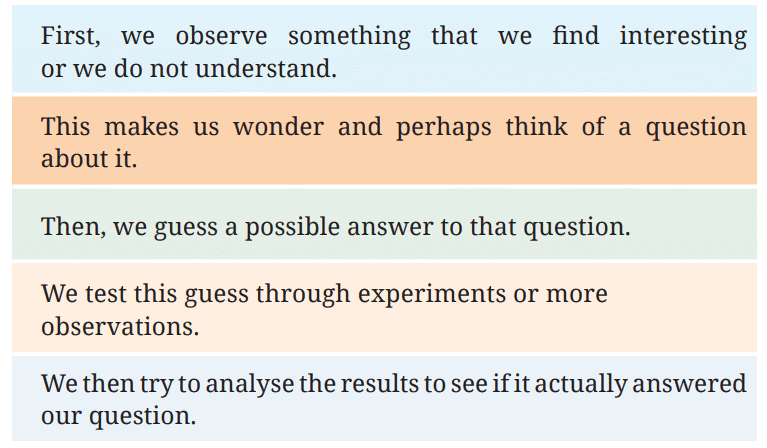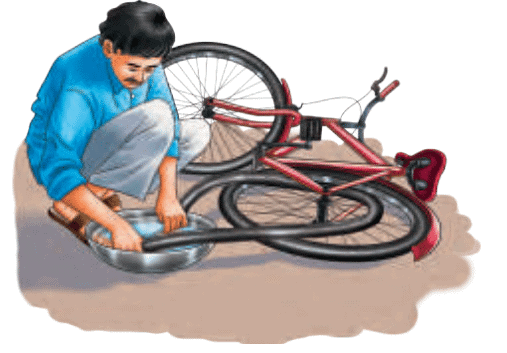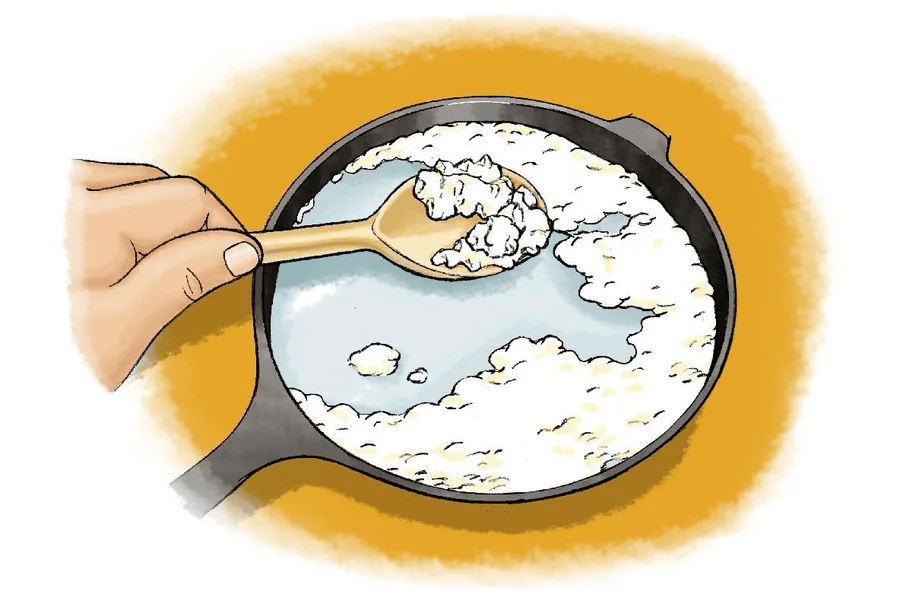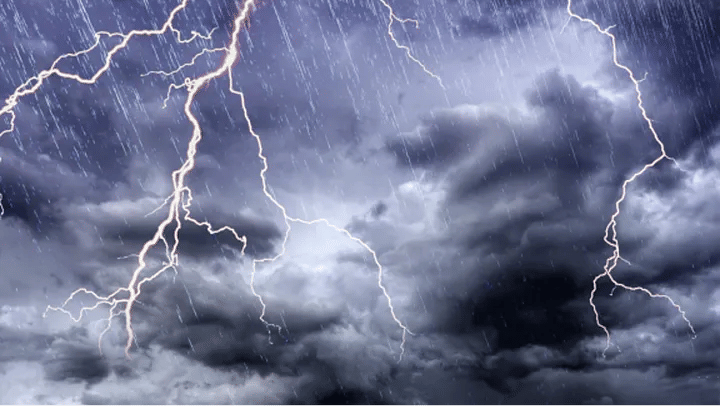NCERT Based Activity: The Wonderful World of Science | Science for Class 6 PDF Download
Activity 1: Let us think and write
- Write about a problem that you tried to solve.
- What steps did you take?
Science is not just about memorising facts and figures or doing experiments. It is about following a step-by-step process that helps us find answers to our questions. So what are the steps that we can follow?
Ans: Problem I Tried to Solve. One day, my bicycle had a flat tyre, and I wanted to find out why.
Steps I Took (Following the Scientific Method Like a Scientist):
- Observation: I noticed that my bicycle tyre was flat, even though I had inflated it the previous day.
- Question: Where did the air leak out from?
- Hypothesis (Guessing the Answer): Maybe there was a small hole or puncture in the tyre.
- Experiment (Testing the Guess):
- I filled the tyre with air again and checked if it deflated quickly.
- I pressed different parts of the tyre to see if I could hear air escaping.
- I dipped the tyre in a bucket of water to look for bubbles, which would show the exact location of the hole.
- Analysis (Checking the Results):
- I found a small hole in the tyre where bubbles were coming out.
- This confirmed that the tyre had a puncture.
 Repairing Bicycle
Repairing Bicycle
Conclusion: Just like a scientist, I followed a step-by-step method to find the cause of the problem. By observing, questioning, testing, and analyzing, I was able to solve the issue. This shows that anyone who follows the scientific method is working like a scientist, whether it is a mechanic, an electrician, or even a cook.
Some more examples of problems and their solutions using a scientific approach:
Problem: One evening, the TV remote stopped working, and I wanted to find out why.
- Solution: I checked the batteries, cleaned the sensor, and after replacing the batteries, the remote worked.
Problem: One day, my schoolbag zipper got stuck, and I wanted to find out why.
- Solution: I carefully examined the zipper, removed any dirt or fabric stuck in it, and used soap to make it move smoothly.
Problem: One afternoon, my kite would not fly, and I wanted to find out why.
- Solution: I checked the wind conditions, adjusted the string length, and used a lighter frame to help it fly.
Problem: One morning, my pen stopped writing, and I wanted to find out why.
- Solution: I shook the pen, tried writing on a rough surface, and changed the refill to fix it.
Activity 2: Let us think and write
- Describe a daily life situation where you feel someone was following a scientific method.
Ans: Situation: Steps Followed (Scientific Method in Action)
- Observation: The milk turned lumpy after adding lemon juice.
- Question: Why did the milk curdle when lemon juice was added?
- Hypothesis (Guessing the Answer): Lemon juice is acidic, and it might react with milk to form lumps.
- Experiment (Testing the Guess):
- She tried adding lemon juice to a small amount of milk.
- The milk curdled again, confirming a reaction.
- Analysis (Checking the Results):
- She researched and found that acids cause milk proteins to clump together, forming curds.
 Milk Curdling
Milk Curdling
- She researched and found that acids cause milk proteins to clump together, forming curds.
Conclusion: This is how paneer (cottage cheese) is made. The scientific method helps us understand why certain things happen in daily life.
Activity 3: Let us think and write
- If you have to ask “Why?” about something, what would you ask about?
- Try to write down how you would attempt to find an answer to your question.
Ans: If you have to ask “Why?” about something, what would you ask about? Question is as follows.
Why does lightning appear before we hear thunder during a storm?
Steps to Find the Answer:
- Observation: During a storm, I noticed that lightning flashes first, and thunder is heard a few seconds later.
- Hypothesis (Guessing the Answer): Light and sound must travel at different speeds.
- Experiment (Testing the Guess):
- I researched the speed of light and sound.
- Light travels faster than sound, which is why we see lightning first and hear thunder later.
- Analysis (Checking the Results):
- Scientists have measured light speed (300,000 km/s) and sound speed (about 343 m/s in air).
- This proves that light reaches us almost instantly, while sound takes time.
 Thunder
Thunder
Conclusion: By questioning and researching, I learned why we see lightning first. This shows that curiosity and observation help us learn more about the world around us.
Final Thought: Science is all about asking questions, experimenting, and discovering new things. Keep exploring and thinking like a scientist.
|
69 videos|288 docs|27 tests
|
FAQs on NCERT Based Activity: The Wonderful World of Science - Science for Class 6
| 1. What are activity types of questions for Class 6? |  |
| 2. How can I prepare for activity type questions in my Class 6 exams? |  |
| 3. What is the importance of activity types of questions in education? |  |
| 4. Are activity types of questions used in all subjects for Class 6? |  |
| 5. How can teachers create effective activity types of questions for their students? |  |






















